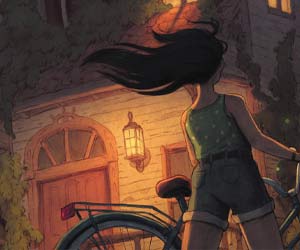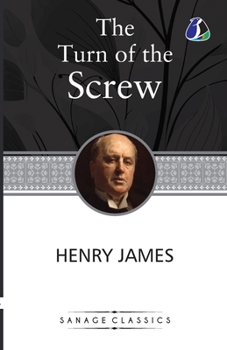The Turn of the Screw
Select Format
Select Condition 
Book Overview
NA
Format:Paperback
Language:English
ISBN:9362052369
ISBN13:9789362052360
Release Date:October 2024
Publisher:Sanage Publishing House Llp
Length:136 Pages
Weight:0.51 lbs.
Dimensions:7.8" x 0.3" x 5.1"
Customer Reviews
7 ratings
How is this a classic??
Published by HK , 5 months ago
I want to apologize for hating this book because it is a “classic”, but I can’t. It’s like anything is a classic just because it was written long ago. This book bores me to sleep several times and it isn’t very long. I love other classics, but this was just terrible. It should have been a short story there was so much description of for inconsequential things/scenes. Honestly if it had been a short story without all that, I probably would have liked it!
Too much writing inside
Published by Sarah , 11 months ago
The book is in ok condition but there are so many annotations inside it's hard to make out the words. The outside is in good condition but the inside is a mess.
Comments from the Publisher
Published by Thriftbooks.com User , 15 years ago
Comments from the Publisher: We apologize for the inconvenience. The book was corrected on April 25th, 2009. The new version has the prologue. MobileReference
Good Read
Published by Thriftbooks.com User , 15 years ago
The story was interesting and worhtwhile reading. The ending leaves all interpretation to the reader so you don't really know what to think.
Turn of the Screw Keeps Turning
Published by Thriftbooks.com User , 16 years ago
This edition provides provacative notes to assist the reader who is not accustomed to the gothic romance genre. Various critical theories are proposed which stimulate attentive reading. My own reading would lean towards the notion that James is satirizing popular horror stories, while at the same time taking jabs at readers who absorb them. In any case, the novella provokes interesting discussion.
The Others
Published by Thriftbooks.com User , 20 years ago
Today's readers may not find Henry James's masterpiece "The Turn of the Screw" as creepy as it was when first published. To begin with, there is no gore in the book --the moments of horror are so subtle, but they get under one skin. "The Turn of the Screw" was first published as a serialized novel in Collier's Weekly. After that it was published in the novel format, both in England and USA. When James wrote this novella was a period of increase of the popularity of spiritual issues. Many people were searching for new ways of explaining death, and they were also loosing their Christian faith. Many were trying to communicate with the Other Side. But the dead in the novella, as James once stated, are not ghosts, as we know them. However, this belief persisted through time, and even today, most readers assume that Peter Quint and Miss Jessel are spectrums or a so-called entity. On the form, "The Turn of the Screw" has some innovations. Prior to James, most novels were written through one point of view --this narrator told the story and the characters and actions are under his/her way of viewing, judgments, and conclusions. On the other hand, most of James's novels count with a difference: the narrator/character is not aware of everything. In this particular novella, we see the story through the eyes of governess and we know as little as she. Not only she, but also we, has a limited knowledge of the events.Much can be concluded from the story --it is impossible to have a definitive conclusion. Some say the governess was a good character fighting against evil to protect the two children. But some scholars have researched and concluded that, as a matter of fact, the governess had a troubled mind. In 1934, Edmund Wilson wrote an essay that has become one of the most influential works on Henry James's ambiguity. Based on Freudian theory, Wilson argues that the governess's sexual repression leads her to neurotically imagine and interpret ghosts. However, postmodernism have led critics to a different conclusion, which adds the two main chains of sturdy of "The Turn of the Screw". Not only are the ghosts in the novel, but the governess can also be mad. For these scholars, every incident can be interpreted as to prove that the governess is mad and to prove that there are ghosts. This irresolvable controversy makes James's work so brilliant and timeless.Now it is up to each reader to find his/her own ghosts in this brilliant novella --so short and so deep and complex. Contemporary readers may be stunned and still scared with the smartness of the text. As the first narrator introduces the text, he says in the first line "the story had held us", "The Turn of the Screw" will hold every sophisticated reader in his/her seat.
a conjectural analysis
Published by Thriftbooks.com User , 25 years ago
One can accept either of the two established opinions -- that the children did see the ghosts and the governess was telling the truth; or that the children saw nothing, but were frightened by the hallucinating governess -- or one can realize that James intended the reader to be nagged by doubt concerning this -- and a few other -- questions. The question of doubt goes beyond the governess's account. Whether or not one believes her, Quint and Miss Jessel are real, evil figures. But how evil can they have been if they left the children so seemingly innocent? If one believes the governess, so evil that the children's innocence is merely a sham. But there is too much doubt planted and not enough known about the nature of the evil for this to be at all convincing. If one disbelieves the governess, then are the children uncorrupted? In that case, what would explain Mrs. Grose's abhorrence? The abundance of unanswerable questions hints at a void at the center of the story. So do, of course, the multiple frames and narrative ellipses. But is that void simply a void, or is it itself a ghost? How many readers have been haunted by this story, unable to shake it, disturbed and unsatisfied? How many, in other words, have felt like the governess felt? Worse, how many have felt the empty evil at the heart of this ghostly void, the feeling that James may be playing a terrible trick, may have something even worse up his sleeve than whatever dark suggestions the reader's own imagination may have conjured up? The story is not unfathomable, however. Like so many of James's other stories, especially those written during the previous few years, it is about a writer -- in this case the governess -- who fails. The children she takes care of are no less imaginary than the ghosts she describes. It is she who muddies the waters, not James. There are evil ghosts out there, but they live in pens and pencils, not old houses.
The Turn of the Screw Mentions in Our Blog

We're Not Alone: 13 Hair-Raising Haunted House Stories for Kids, Teens, and Adults
Published by Ashly Moore Sheldon • October 21, 2020
What's that noise? Why are the lights flickering? Did you see something in the mirror? Do you feel like you're being watched? Who shut that door? Here are thirteen tales, for a range of ages, about haunted houses and those who live in them.







